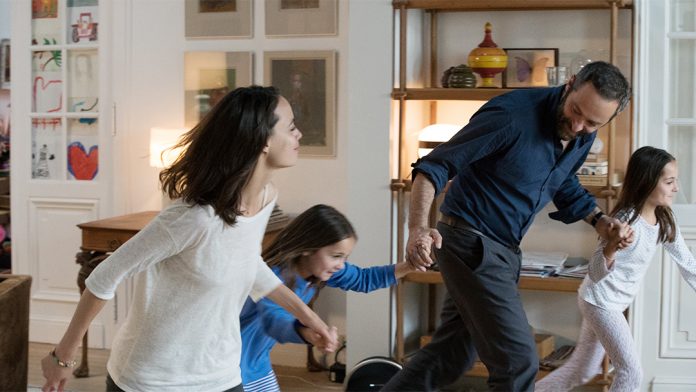When Joachim Lafosse’s Our Children was played at London Film Festival back in 2012, what stood out was the filmmaker’s unwavering commitment to realism, with a searingly naturalistic drama that evoked a collective of remarkable leading performances. His latest endeavour, four years on, can be accredited with the very same accomplishments, as After Love thrives in a similar notion, as a drama so authentic, it’s challenging to work your way through.
The premise is gloriously simple; Marie (Bérénice Bejo) and Boris (Cédric Kahn) have broken up. After 15 years of marriage, and with twin daughters, played by Jade and Margaux Soentjens, the love that once burned so deeply between them has vanished, and the pair can barely stand being in one another’s company. The divorce settlement is on the horizon, causing friction given Marie is the breadwinner, and is having to part with more cash that she feels her ex-deserves. But without any money he’s unable to move out, and so the pair attempt to live together under one roof until the situation is resolved, arguing, fighting, making love – vying desperately to maintain a genial environment for their daughters, and keeping their pure disdain for one another at bay, as the finish line seems to edge further and further away.
The beauty to this film – and as is evident in the very title – is that we focus solely on the present, and future, not dwelling on the past, not even learning of why their marriage came to an end. Though undoubtedly helpful to contextualise the situation, why does it matter? It’s almost trivial, superfluous information, the fact of the matter is they’ve broken up, and now are left to deal with the outcome.
What also transpires from the lack of background information is the ability for the viewer to remain neutral, seeing both sides of the story, and witnessing both Marie and Boris for all their flaws. In certain scenes she seems like the irrational one, in others, he’s the monster. Lafosse allows us to make our own mind up on the matter, he doesn’t dictate nor manipulate our emotions, he effectively just allows his camera to remain in their abode and to linger, and we barely have any scenes that take place in any other setting.
This is what allows After Love to differ from other Hollywood productions that cast their eye over a similar set of circumstances, such as Blue Valentine, for instance. That film is made up of flashbacks, leaving little to the viewer’s imagination. But not in the case of After Love, Lafosse gives his audience the freedom to work it out themselves, to create our own movie – and the results, no matter which side you take, or which way you turn, are almost certainly going to be rewarding.









